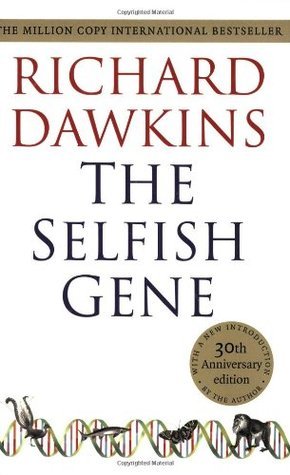What do you think?
Rate this book


360 pages, Paperback
First published January 1, 1976


ما كفاية أنا واحده يا أستاذ عبدالباسط بلاش الإسراف ده
أنا أنا أنا أنا أنا أنا أنا أنا أنا أنا
أنا مش عارفنى أنا تهت منى أنا مش أنا







روح ع الأشرافية ولأصحابك أشكي
قول أني نكدية وشو ما بدك أحكي
قول عني أنانية قول مش رومانسية
فش كل خلقك فيي
أنا بعرف إنك مقهور وقلبك راح يفقع .!!
شوف حالك عليي تكبر لا تشبع
أزرع كل حقدك فيا فل وما ترجع
“Una gallina es solo la forma en que un huevo hace otro huevo“ (Samuel Butler 1835-1902)La evolución es un hecho que solo un fanático religioso puede negar: antes había animales que ahora no existen y ahora existen animales que antes no. Aunque esto era conocido ya antes de Darwin, él tuvo la genialidad de idear un mecanismo que explicara cómo se producía esa evolución: la selección natural. Su explicación ha sido modificada con posterioridad de forma sustancial en base a los nuevos conocimientos sobre genética, mecanismos de la herencia, registros fósiles, etc. hasta dejar de ser una teoría, una hipótesis, para convertirse en una ley científica al mismo nivel de credibilidad que cualquier otra ley establecida por la ciencia.
“Un cuerpo es el medio empleado por los genes para preservar los genes inalterados.”Tomar al gen como unidad de selección explicaría, por ejemplo, el altruismo, esto es, cómo es posible que un individuo quiera aumentar el bienestar de otro ser semejante a expensas de su propio bienestar. La respuesta es que los genes “pueden alcanzar mejor sus objetivos egoístas fomentando una forma limitad del altruismo a nivel de los animales individuales.” El libro expone muchos ejemplos en el que comportamientos que en principio pueden parecernos altruistas pueden ser interpretados como una forma de egoísmo tanto a nivel del individuo como a un nivel más profundo y realmente inquietante, el del gen.
“Los memes se propagan en el acervo de memes al saltar de un cerebro a otro mediante un proceso que… puede llamarse imitación... Si los memes de los cerebros son análogos a los genes, deben ser estructuras cerebrales autorreplicadoras, patrones reales de conexión neuronal que se reconstruyen a sí mismos en un cerebro después de otro.”Así, también los memes están expuestos a un mecanismo de selección, de tal forma que serán favorecidos aquellos que “explotan su medio cultural para su propia ventaja”, siendo su medio cultural el acervo de memes existentes en cada momento.

“ There are more possible games of chess than there are atoms in the galaxy.”
“What is the good of sex? This is an extremely difficult question for the evolutionist to answer. Most serious attempts to answer it involve sophisticated mathematical reasoning.”
“Contraception is sometimes attacked as 'unnatural'. So it is, very unnatural. The trouble is, so is the welfare state. I think that most of us believe the welfare state is highly desirable. But you cannot have an unnatural welfare state, unless you also have unnatural birth- control, otherwise the end result will be misery even greater than that which obtains in nature.”
Female greenflies can bear live, fatherless, female offspring, each one containing all the genes of its mother. (Incidentally, an embryo in her mother's 'womb' may have an even smaller embryo inside her own womb. So a greenfly female may give birth to a daughter and a grand- daughter simultaneously, both of them being equivalent to her own identical twins.)
“Mantises … When they mate, the male cautiously creeps up on the female, mounts her, and copulates. If the female gets th e chance, she will eat him, beginning by biting his head off, either as the male is approaching, or immediately after he mounts, or after they separate.”
"the notable thing about animal fights is that they are formal tournaments, played according to rules like those of boxing or fencing. Animals fight with gloved fists and blunted foils. Threat and bluff take the place of deadly earnest. Gestures of surrender are recognized by victors, who then refrain from dealing the killing blow or bite that our naive theory might predict.”
